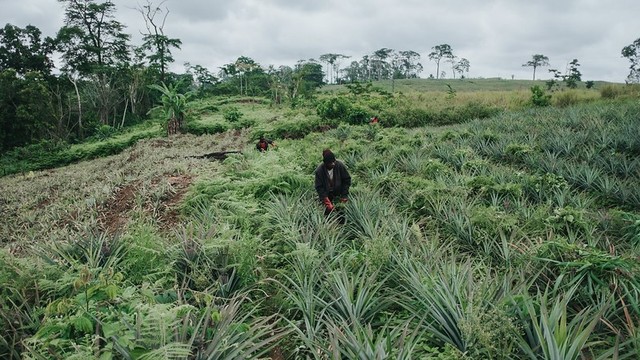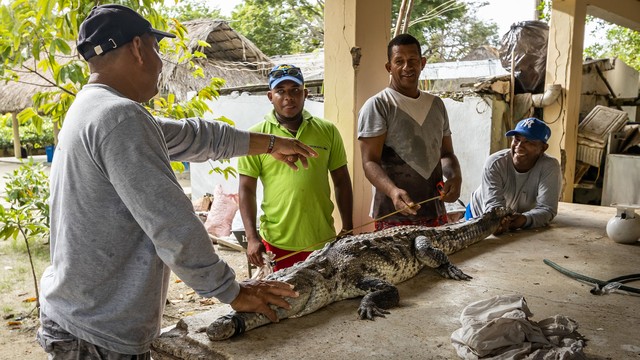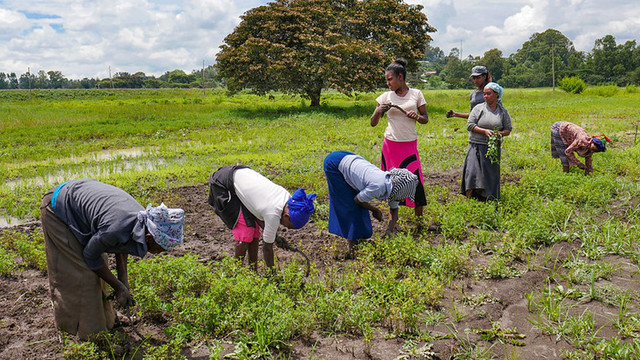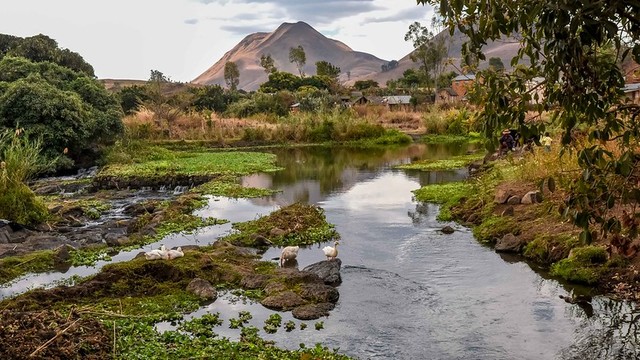Mainstreaming biodiversity and development initiative: events
This page sets out the workshop reports and statements produced as part of the Mainstreaming Biodiversity and Development initiative.
The Mainstreaming Biodiversity and Development project supported African countries to use their national biodiversity and strategy action plans (NBSAPs) as a vehicle for integrating biodiversity into development policy and planning.
Between 2012 and 2017 IIED and partners delivered a series of workshops on how governments could link their NBSAPS with other development planning. This page lists the papers, workshop reports and statements related to those events.
2016 Side event report: Mainstreaming biodiversity and development and the SDGs
This workshop report summarises a side event organised by the project at the thirteenth meeting of the Conference of the Parties to the Convention on Biological Diversity in Cancun, Mexico, December 2016 (CBD CoP 13). The workshop aimed to take stock of existing biodiversity mainstreaming initiatives and share case studies of how governments are linking their NBSAP with sectoral priorities, development planning and Sustainable Development Goal implementation processes.
Statement on mainstreaming biodiversity in practice
This Accra Statement was issued by the African Leadership Group of the Mainstreaming Biodiversity in Development Policy and Planning initiative following an international workshop on 'Success in mainstreaming – sharing lessons, co-developing guidance and scaling up', held in Ghana in November 2016.
The statement says it is time to mainstream biodiversity in practice – going beyond policy, plans and other statements of intention. Mainstreaming is not complate until biodiversity is at the heart of development in all districts and sectors.
Workshop report: Mainstreaming biodiversity into development policy and planning
The second international workshop for the Mainstreaming Biodiversity into Development Policy and Planning Initiative (2015-17) was held in Ghana in November 2016. The workshop report summarises the event. The workshop objectives included finalising ideas for the biodiversity mainstreaming event planned for the meeting of the Convention on Biological Diversity held in December 2016; reviewing mainstreaming capacity tools; outlining post-project priorities and communicating key messages from the workshop.
The presentations from this workshop are all available on IIED's SlideShare site. You can view and download the presentations using the links below:
- Biodiversity mainstreaming: progress and challenges in Uganda
- Mainstreaming biodiversity: Seychelles progress and challenges
- Country mainstreaming targets and planned outcomes
- Measuring mainstreaming progress, success and impact guidance
- Biodiversity indicators: a quick guide to indicator development
- Influencing national public budget processes to integrate environmental sustainability
- Natural capital accounting: a tool for biodiversity mainstreaming?
- The use of spatial data in policy development and review
- Biodiversity mainstreaming success: lessons learnt from the African leadership group
- Country communication strategies
- Mainstreaming biodiversity in development policy and planning initiative: an overview
- Biodiversity mainstreaming in Namibia: progress and challenges
- Biodiversity mainstreaming in Zambia: progress and challenges
- Biodiversity mainstreaming in Botswana: progress and challenges
- Biodiversity mainstreaming in Malawi: progress and challenges
- Biodiversity mainstreaming in Zimbabwe: progress and challenges
Country meeting reports
In late 2015 and throughout 2016 countries participating in the Mainstreaming Biodiversity initiative held meetings to identify the key targets for mainstreaming in their respective countries.
- The Malawi report identifies the revision of the country's Growth and Development Strategy, revision of the National Land Policy and the revision of the Environmental Impact Assessment guidelines.
- The Seychelles workshop focused on the Blue Economy Road Map and the Tourism Strategic Action Plan
- The Zimbabwe report identifies the Sustainable Development Goals as an opportunity.
- The draft Botswana report outlines discussions around entry points for influencing development planning at the district level.
- The Namibia report looks at progress made by the country's working group implementing NBSAPS, and highlights the need for an integrated communication, education and public awareness strategy on environmental issues.
Harare Statement on using NBSAPs as a tool for mainstreaming biodiversity
The Harare Statement on using an NBSAP as a tool for mainstreaming biodiversity into national and sectoral development policies was drawn up by the participants at the Harare workshop in November 2015. The statement presents lessons and priorities for biodiversity mainstreaming in an era of Sustainable Development Goals and a move towards the green economy.
Workshop report: Mainstreaming Biodiversity into Development Policy and Planning
The first international workshop on this initiative took place in Harare, Zimbabwe in November 2015. The workshop aimed to provide support to countries to formulate national NBSAP mainstreaming implementation plans, sharing tips and tactics on using the NBSAP as a tool for mainstreaming, and identifying capacity and guidance/tools required to support countries in mainstreaming biodiversity into development priorities.
Background paper: Defining success
The background paper 'Defining and assessing success in mainstreaming' was produced for the third international workshop for the NBSAPs 2.0 project in July 2014. It reviews the mainstreaming targets and indicators of selected NBSAPs from countries at different stages of their mainstreaming process, and the approaches to assessing the success of mainstreaming biodiversity and other issues into development.
2013 Side event at the CBD Global Workshop on the NBSAPs Revision Process
Representatives from Botswana, the Seychelles and Namibia presented their key lessons at a side event to the CBD global workshop in Nairobi on 12 November 2013. You read a report on the workshop and view presentations.
Project updates
Between 2013 and 2017 we published regular project updates; you can read these below:
July 2017
The final guidance from the Mainstreaming Biodiversity in Development Policy and Planning Initiative brings together the learning from the members of the African Leaders' Group around mainstreaming biodiversity. An easy to read but comprehensive document, this guidance is the final output from the project.
Mainstreaming biodiversity and development. Guidance from African experience 2012-17
[accordion]
February 2017
In November 2016 the second international workshop for the Mainstreaming Biodiversity initiative was held in Ghana, with participants from the eight countries in the project. The workshop summary report and the Accra Statement can now be downloaded.
November 2016
IIED, UNEP-WCMC and the Convention on Biological Diversity Secretariat will be hosting a one-day event (PDF) at the Convention on Biodiversity COP in Cancun on Sunday 11 December 2016 to look at the challenges of mainstreaming biodiversity in development planning processes in the context of the Sustainable Development Goals (SDGs). Sessions looked at successful approaches and consider case studies from countries linking NBSAPs to the SDGs.
October 2016
Three workshops were held in Botswana to look at entry points for influencing at district level. The second international workshop for project members is taking place in Ghana from 1-3 November. Participants will share progress and lessons learnt so far with mainstreaming activities, develop guidance together for other countries and discuss how mainstreaming work can be scaled up successfully.
July 2016
National workshops took place in Malawi, Zambia, Ghana, Seychelles, Zimbabwe and Uganda. A report from Namibia looks at progress made by the country’s working group implementing the NBSAP.
In a video interview, Crispen Phiri, an ecologist at Chinhoyi University of Technology, explains some of the resource challenges of mainstreaming biodiversity in Zimbabwe.
June 2016
In Malawi, the project made contributions to the on-going review of Environmental Impact Assessment guidelines. Provisions for biodiversity and biosafety have also been included in the Environmental Management bill. Work is on-going in promoting biodiversity within Malawi’s Growth and Development Strategy.
Lilongwe City is developing a new project with ICLEI to promote biodiversity mainstreaming at the city level, building on the previous work with ICLEI. You can read about the project in this story of change.
In Zambia, project members are focusing on the country’s Seventh National Development Plan (NDP7) and have organised a stakeholder validation workshop. The NDP will be finalised by December 2016.
April 2016
At the Harare workshop in November 2015 there was much conversation about how many efforts to integrate biodiversity into development plans and budgets involved communications work. This might be by informing the right people about a relevant news story, setting out in a brief way the impact of a particular policy on biodiversity loss or conservation, or engaging a targeted group in debate. As a result, IIED and UNEP-WCMC have put together a new booklet on Writing about biodiversity: tips and templates for policy and media material which contains guidelines about good writing, as well as tips for writing effectively for policymakers and the media.
March 2016
We welcomed new countries at a workshop held in Harare, Zimbabwe in November 2015. Representatives from Zimbabwe, Ghana, Malawi and Zambia joined those from Uganda, Namibia, Botswana and Seychelles for lively discussions about the next phase of the Mainstreaming Biodiversity and Development Initiative. You can read the workshop report and also the Harare Statement on using NBSAPs as a tool for mainstreaming biodiversity into national and sectoral development policies. The statement was put together by the workshop participants.
Jonathan Davies
It is with great sadness that we have learnt of the death of our colleague, Jonathan W. Davies. A senior staff member of Liberia's Environmental Protection Agency, Jonathan was coordinator of the National Biodiversity Programme, as well as National Focal Point for the Convention on Biological Diversity. Jonathan was a leader in linking the critical worlds of biodiversity conservation and poverty reduction. He was an independent member of the African Leadership Group (ALG) of the Mainstreaming Biodiversity in Development Policy and Planning initiative. Colleagues in several African countries, in IIED and in UNEP-WCMC, will remember his sage advice - always delivered in friendly, deep tones. His sudden passing away is a great loss to the biodiversity community.
Jonathan was popular and held in high regard with all who came into contact with him. Our thoughts and prayers are with Jonathan's family and friends. He will be remembered for his selfless and continuous efforts to make the world a better place.
November 2015
We are looking forward to the first workshop with the expanded group of African countries to be held in Harare from 17-19 November. Below are updates from four of the countries in the African Leaders Group.
The Zimbabwe team held a national workshop on the 5 November attended by about 25 members of the National Biodiversity Forum — a multi-stakeholder forum of civil society groups, government ministries and private companies. Participants used a strategic diagnostic guide to select the development sectors which would form the focus areas for mainstreaming work. The diagnostic guide will be deployed further in the forthcoming Harare project workshop.
The country has finished revising its NBSAP and the Minister of Environment will launch it in the near future.
Botswana: The same diagnostic tool has been discussed with the Botswana Government. Botswana’s new National Development Plan (NDP) is under development and will be aligned to the country’s Vision for beyond 2016, and some of the elements of the revised NBSAP are being included in the plan. There are discussions on how to budget for biodiversity under the BIOFIN project, and this presents opportunities to align biodiversity mainstreaming with development initiatives in other government departments.
Namibia’s project focal point held a meeting with the Permanent Secretary of the Ministry of Environment and Tourism (MET) in late October to discuss the national biodiversity plan and the climate change plan and how to link up initiatives such as implementing the Sustainable Development Goals with managing biodiversity. The team will use a meeting on 3 December to decide on areas of focus for mainstreaming work. The country already has over 25 national diagnostics on access and benefit sharing, and hopes to develop a similar diagnostic on the economics and mainstreaming of biodiversity by February 2016.
Malawi has decided its focus will be on ensuring mainstreaming of biodiversity in the Malawi Growth and Development Strategy which is under development. The team has developed a questionnaire to start the process.
August 2015
The final publication from the first three years of the NBSAPs 2.0 project is 'Stories of change: mainstreaming biodiversity and development'. Five short stories from Zimbabwe, Namibia, Malawi, South Africa and Uganda relate the experience of bringing together development and biodiversity specialists to make sure that biodiversity is considered in government and private sector planning.
The stories come from members of the Africa Leaders' Group of the NBSAPs 2.0 project and illustrate how making a difference through small changes sometimes takes years to achieve - but all such changes have the potential to turn into something bigger and more long term.
April 2015
Over the past three years the project group has discussed and exchanged experiences on reciprocal biodiversity-development mainstreaming and the best ways to achieve this. The results – expressed in highly practical terms – can be seen in our new publication 'Mainstreaming biodiversity and development: tips and tasks from African experience'.
March 2015
Are you revising your country's NBSAP? Are you wondering whether the revised version will be fit to serve as an instrument for mainstreaming biodiversity into key development policies, plans and processes, and at the same time address important development issues?
We are pleased to announce a new publication entitled 'Putting biodiversity at the centre of development: a checklist for reviewing the mainstreaming potential of a country's NBSAP'. This short checklist provides a simple structure for reviewing a country’s NBSAP to make sure it contains the essential ingredients for biodiversity mainstreaming.
The content is grounded in the experience of the project members, each of whom has been involved in revising their country's NBSAP.
January 2015
Uganda: The NBSAP team is currently finalising and editing the revised NBSAP and preparing project reports and an evaluation of the project in preparation for its phasing out. It hopes to share an approved and signed plan with the CBD by March 2015. In early January 2015, the team met with the Darwin Initiative to brief them and give them a better understanding of the NBSAPs 2.0 project in Uganda, its replicability and the influence it has had on policy, as well as other potential impacts.
The Seychelles has finished its NBSAP and the team is waiting for it to be approved by the CBD and then the government. In Zimbabwe the draft NBSAP is being professionally edited and printed.
Namibia has completed its NBSAP, and the priority now is getting the resources in place for implementation.
Likewise, in Botswana, now that the NBSAP is finished, the team is thinking about options for financing its implementation through the Biofin project, which is UNDP-supported and implemented with the Ministry of Finance. It is costing the implementation and looking for potential sources of finance – both from government and non-government. The hope is that the NBSAP will be included in the next five-year National Development Plan once work on it resumes, following the completion of the Vision Beyond 2016 exercise.
October 2014
A successful and enjoyable workshop took place in Namibia with more than 30 participants from the project countries, international organisations and Namibian government considering what successful biodiversity and development mainstreaming would look like and how it could be achieved.
A report of the main workshop conclusions and interviews with workshop participants are online. The Windhoek Statement drafted by participants sets out the main focus of the workshop.
July 2014
Event: Biodiversity mainstreaming – what does success look like?
The whole project team is getting ready for the workshop in Namibia from 23-25 July which will look at the challenges of implementing a NBSAPs and asking 'what does successful mainstreaming look like?'.
NBSAPs 2.0 close to completion
NBSAPs 2.0 project countries are making excellent progress on revising their NBSAPs. Botswana has a draft ready and this will be peer reviewed at the project workshop.
Monique Akullo of the National Environment Management Authority, reported that Uganda has almost completed the process of review and update. She said: "We are planning to hold the second stakeholder review workshop to get final input from stakeholders before the consultant can conclude his task." But the essence of the revised NBSAP has already been mainstreamed into the ongoing review of the National Development Plan.
Zimbabwe hopes to launch its NBSAP 2.0 in August 2014. The process to get this far has been highly consultative: "We have had a good group of stakeholders involved from local communities to NGOs to other government departments and local government," says Chip Chirara. "We've had comments on a first draft and have incorporated changes. We're ready to submit the NBSAP to the permanent secretary for the environment, who will then pass it to the minister for sign off." The NBSAPs team hopes to launch the plan in August or early September with a high-profile event attended by the minister or vice-president. It has funding from UNDP to promote the NBSAP in advance of the launch with adverts and media articles.
Looking ahead to implementation, Zimbabwe has an action plan and monitoring framework and has costed activities. The challenge will be pinning down resources to support these.
March 2014
South Africa's success factors for biodiversity mainstreaming
South Africa has recently published its fifth national report to the Convention on Biological Diversity [PDF] and, among many interesting things, it notes from its experience the key success factors for biodiversity mainstreaming including:
- Paying close attention to policy and institutional context. Mainstreaming biodiversity into the policy, planning, decision-making or management processes in another sector requires an intimate understanding of the policy and institutional context in that sector, which can be developed only through substantial contact and careful listening
- Building ongoing relationships. Mainstreaming is not a one-off event but a process, which can be achieved only through building ongoing long-term working relationships with key individuals in the receiving sector
- Providing in situ support. No matter how user-friendly the maps and guidelines are, mainstreaming can never be achieved simply by handing maps or guidelines over and expecting them to be used. Training workshops help with uptake, but are also not sufficient. Successful mainstreaming requires in situ support to users of the tools, usually over an extended period (for example several years)
- Convening regular forums for co-ordination and sharing lessons among those involved in mainstreaming in a particular sector, and strengthening networks of relationships between key individuals. These forums can take the form of, for example, task teams or learning networks
- Although the immediate benefits of bringing people together to share, learn, and discuss are often hard to quantify, investing time and resources in such processes can be invaluable for developing shared objectives and understanding across sectors and disciplines, thereby helping to embed mainstreaming outcomes.
It also highlights two lessons which will inform the revision of the NBSAP:
- The need for greater realism about what is achievable in the time period between NBSAP reviews, particularly for mainstreaming activities
- The need in some cases to be less specific about particular policy and institutional processes or issues, as the policy and institutional environment is often characterised by substantial flux.
February 2014
The long awaited Developing a business case for biodiversity is now available. It is aimed at environment officials, practitioners or policymakers who need to build a case for integrating biodiversity into decision-making processes and policy development in other sectors. The guide follows a simplified process for generating and presenting compelling evidence.
We've also had updates from three project countries in the last few weeks.
Uganda has made excellent progress in the last few months and the team has finished drafting its national biodiversity strategy. It has set targets and actions and is now in the process of costing the actions.
Getting the national planning authority on board has made a significant difference – staff are now regular participants in NBSAPs activities. In fact, the NBSAP 2.0 incorporates biodiversity relevant elements from the country's Vision 2040 so that when the NBSAP is implemented it contributes to national goals. Uganda project members expect a fully revised, costed and approved NBSAP 2.0 by December 2014 at the latest.
Zimbabwe project members have been busy with meetings and working groups on communications, policy issues and setting targets. "We've worked with the technical working group to set our targets for NBSAPs. And we had a meeting at the end of February to develop indicators and a monitoring framework," said Chip Chirara.
The Zimbabwe team commissioned four strategic studies to support and inform the NBSAPs, which they can share shortly:
- Valuation of ecosystem services
- Climate change and biodiversity
- Mainstreaming biodiversity in other sectors: do they think of biodiversity when making their plans – in finance, mines and agriculture, for example. Are policies governing resources considering biodiversity?
- Protected areas systems: putting a value on how much it costs to manage protected areas and what value are parks, communities, government getting out of activities such as hunting, tourism and so on.
They would like to have a draft NBSAPs 2.0 by the end of March 2014 and are keen to ask an international team to review the document.
The Seychelles is preparing a summary memo for the minister of environment and energy, then the draft NBSAP 2.0 will go to Cabinet for approval by the end of March. Once approved, the team plans to produce the revised NBSAP in an attractive and accessible format for a wide audience.
December 2013
We organised a side event at the November 2013 CBD Global Workshop on the NBSAPs Revision Process. You can see a summary of this side event and presentations on lessons learned by project teams from Namibia, Botswana and the Seychelles.
The full Entebbe workshop report is now available online. We're pleased to make available Ten steps to mainstreaming biodiversity, a practical, short booklet outlining the basic steps to integrating biodiversity needs with development planning. If you want to know where to start, or think that double checking you are doing the right thing would be useful, then this publication is for you. It refers to other resources available or forthcoming from the NBSAPs 2.0 project and is based on the experience of project members.
Plus, you can now read this Reflect & Act from IIED, outlining how being part of the project has changed the project members' approach to mainstreaming biodiversity.
Entebbe project workshop, Uganda, 8-12 July 2013
The NBSAPs 2.0 Mainstreaming Biodiversity and Development project held the second workshop for project countries in Entebbe, Uganda. The workshop was held jointly with the UNDP Biofinance project.
You can hear direct from Jonas Nghishidi in this short film about how Namibia has progressed with drafting its second NBSAP, or download the workshop presentations.
We heard from Jonas Nghishidi about the process leading up to Namibia's first draft of their second NBSAP and were able to provide feedback on the draft – they are doing well to have got this far in a relatively short time. Ronald Kaggwa from the National Environment Management Authority in Uganda presented the case for including biodiversity in the country's development plans. It was an excellent presentation; Ronald will now work to support it with specific examples of where biodiversity has contributed to local livelihoods and national development.
We looked at useful tools for improving mainstreaming and focused again on making a compelling business case for biodiversity – in just three minutes. Country teams rose to the occasion, with Team Seychelles narrowly awarded victory.
The formal Entebbe statement on biodiversity in development planning was released at the end of the workshop.
[/accordion]




